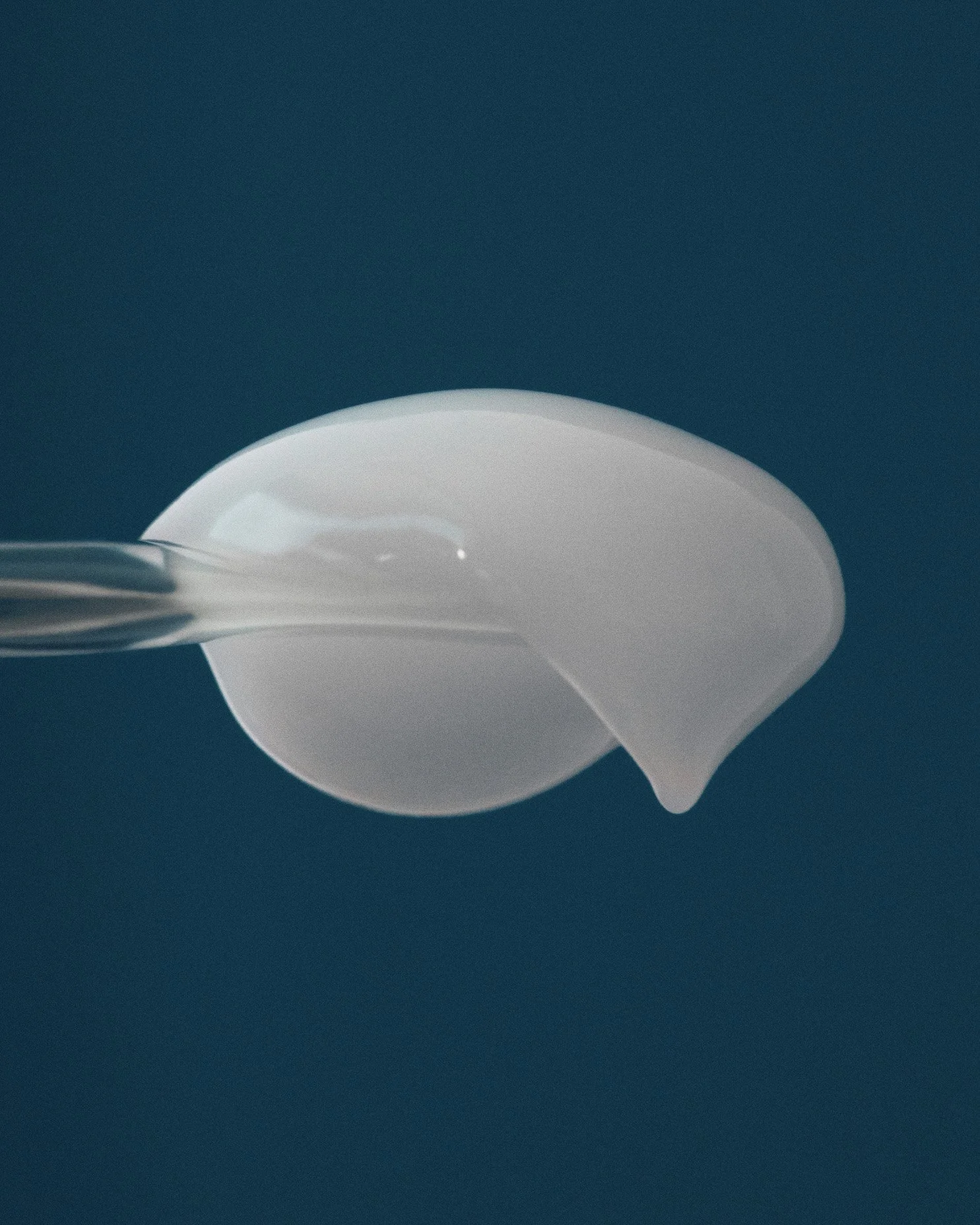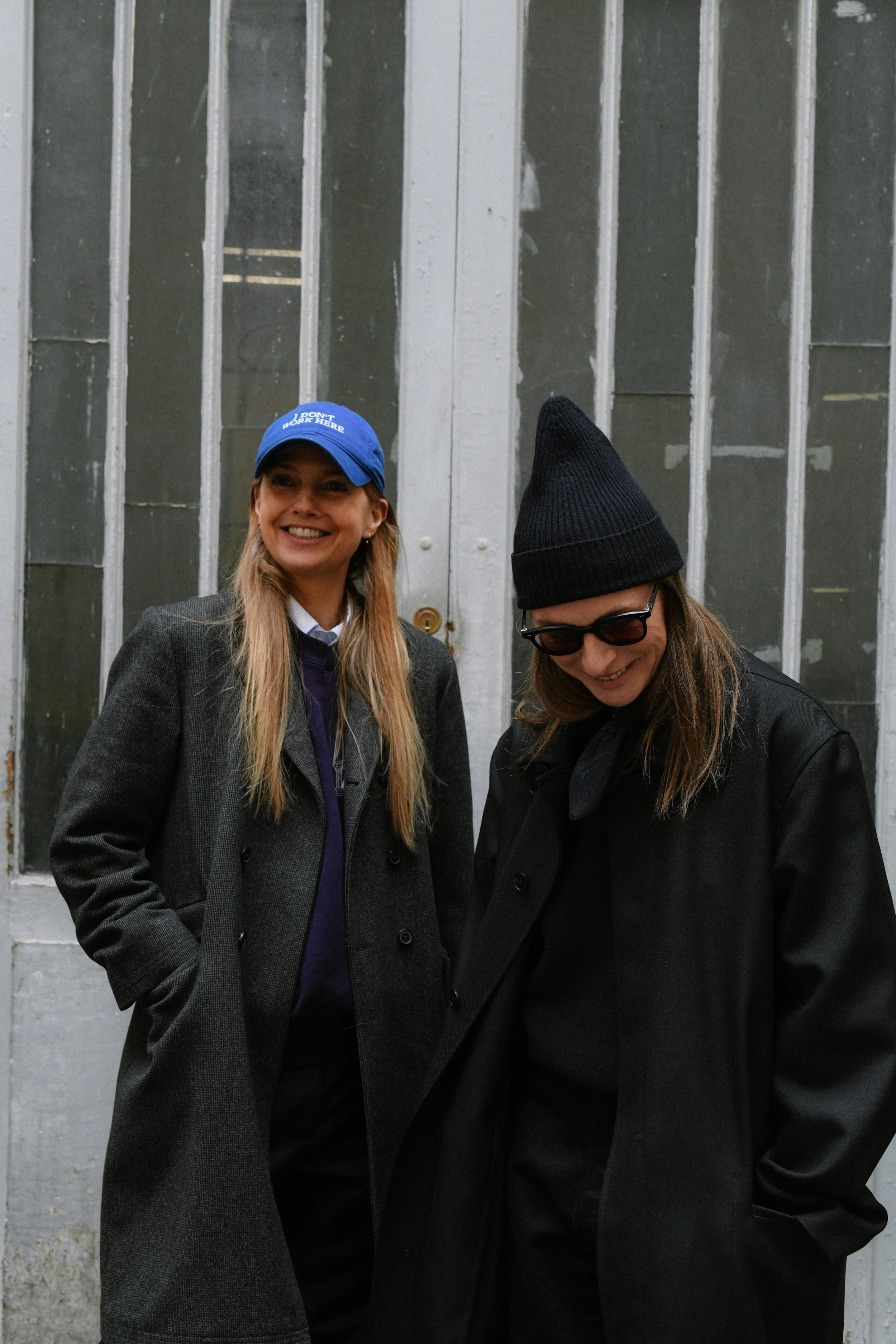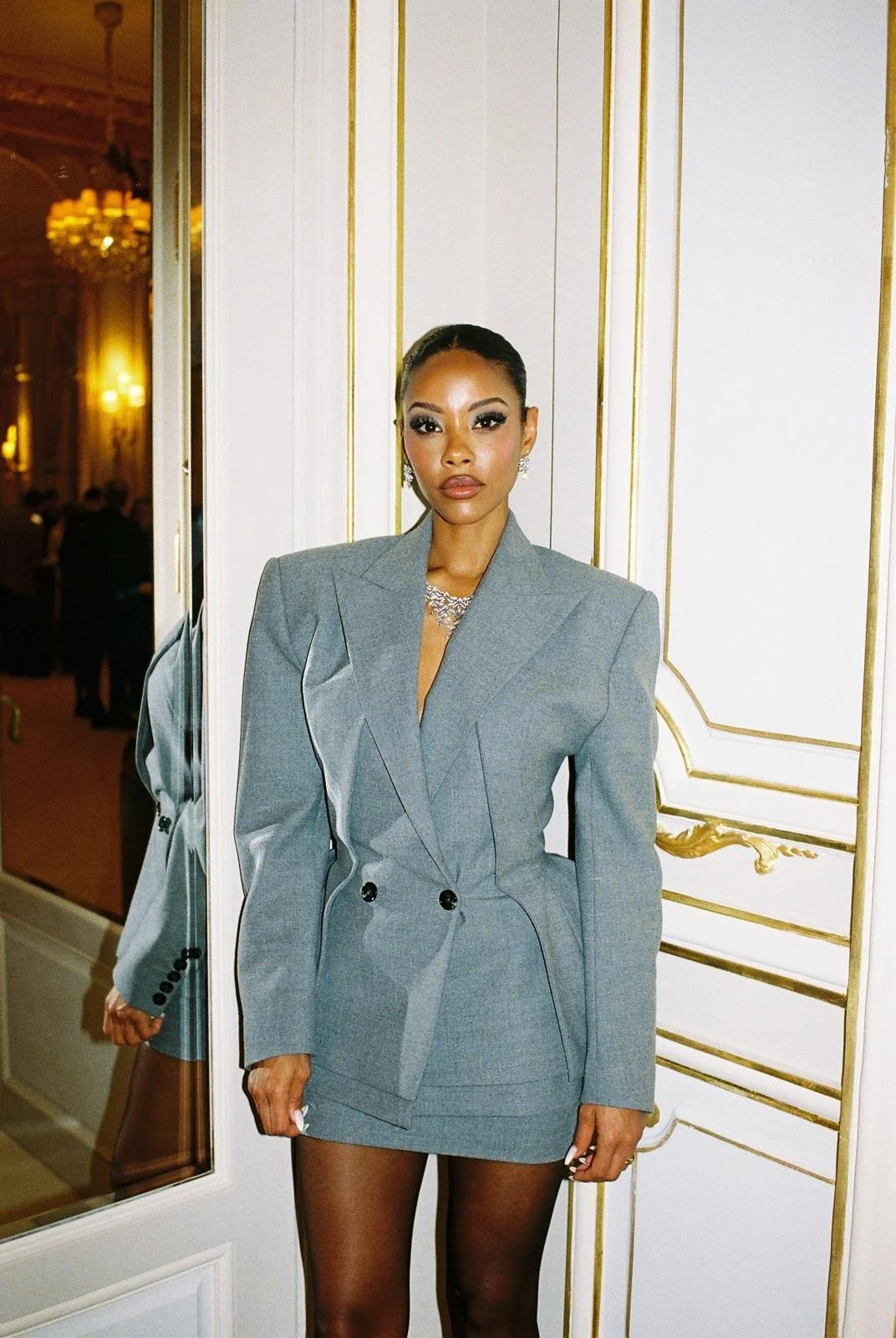The Woman Who Defines Culture From Behind the Scenes
Courtesy of Humanrace.
Rachel Muscat
The Woman Who Defines Culture From Behind the Scenes
By Bonnie Langedijk
Rachel Muscat has always had an entrepreneurial spirit. And we’re not talking about lemonade stands. From the moment she started working for German sportswear giant Adidas, Muscat embraced every opportunity to bring culture to the forefront. The Melbourne native quickly worked her way up to Global Director of Icon Collaborations. From behind the scenes, she engineered some of the brand’s most celebrated collaborations including the collections with Jeremy Scott and Opening Ceremony to Pharrell and Kanye West’s YEEZY. Not scared of taking risks, Muscat recognized these tastemakers long before most of us did, and with it redefined culture in more ways than one. After a decade of working at Adidas, she’s now building a business of her own. In November of 2020, she launched Humanrace alongside longtime collaborator Pharrell Williams. Working with a philosophy-first mindset, the brand’s key focus is on creating tools that make you feel good – whether that’s through a moisturizer, a new sneaker or an object for the home. While the first iteration of Humanrace is focused on skincare, Muscat and the founding team are creating a new blueprint for what a brand could be. One product at a time.
Humanrace’s Humidifying Body Cream mimics the moisturizing benefits of humidity. The cream contains Bakuchiol and Peptide to smooth and strengthen the skin barrier, while the Snow Mushroom Extract locks in moisture. Courtesy of Humanrace.
Rachel Muscat, Pharrell Williams and Dr. Elena Jones at SSENSE. Courtesy of Humanrace.
Bonnie: Much of the work you've done really is at the center of what defined culture at that time. From the artists you've worked with to the products you've launched and now as the CEO and co-founder of Humanrace. When you look at the landscape, how and who shapes culture now?
Rachel: Culture continues to be the intersection of ideas, community, music, art, and where we find ourselves today is that we have so much more access like no other generation ever had. You used to have to travel to a city to really see a product or be inspired by different communities, subcultures. Culture now I see more and more is a mixture of both, and we are wanting more IRL moments to discover and discuss, and brands, fashion houses want to remain part of this. It’s why I was personally very excited and motivated by Pharrell’s appointment as Creative Director Men’s at Louis Vuitton. For us when we were building Humanrace, how and what culture would look like in a future state was always a consideration. What we wanted to build was beyond one product type, and focused more around the spirit and feeling it would give you. It always comes back to the authenticity of what is being built and built by people that really care about what they are bringing into the world.
“As a BRAND, you have to sit in an authentic space and know who you are.”
It does feel like we’ve moved on from subcultures to building community around individuals and brands – and consumers wanting to deepen their relationships with the people and brands they care about. It seems to be shifting to building relationships of trust rather than defining your loyalty or interest by listening to certain music or wearing certain clothes.
Rachel: It's such an interesting time to watch and see how this next round of trends are going to evolve. It’s a resurgence and respect for what’s come before and there’s a new generation that are seeing those brands for the first time. It's such a dynamic time for all of us, and things move so fast. As a brand, you have to sit in an authentic space and know who you are. There’s always a danger of following a trend that moves fast, and it can also disappear as fast.
People often think about a brand applied to one category. What has it been like for you to build Humanrace as an overall philosophy that can be expressed across various product categories?
Rachel: There will always be a product that is the defining entry for somebody to come into a brand. Our ambition was always to help people morph into their best selves. From the way the product makes you feel: wearing a sneaker or putting skincare on your face. There is however a tendency of this idea to become your best self, it’s just to physically fix yourself, but it goes beyond that. Our philosophy was rooted in this concept of having nothing in your house that you don’t know to be beautiful or know to be useful. So you’re considering all parts of being well. And it starts with trust; a customer becomes a part of your community and trusts what you do and that’s something that we work every day to achieve.
Definitely.
Rachel: I was having a conversation with someone the other day about the Humanrace three-minute facial, and that those three minutes are an essential part of the day. When you are physically washing your face, there's nothing else you can do but be in your head thinking about your day. It's about the idea of something helping you improve the next steps of your life. Even with the sneakers, people buy products because they want to feel good, and they love what it represents or who it represents. That's that red thread.
Courtesy of Humanrace.
Humanrace’s 7D Retrograde Gel Cleanser gently cleanses the skin as the first step in your routine. Courtesy of Humanrace.
I couldn’t agree more. What made you want to start with skincare or beauty?
Rachel: I don't even think we thought twice. We were already working on the Adidas collaboration and we always talked about being authentic to what categories we decide to go into. The essence of the storytelling around Humanrace was around Pharrell sharing his codes. There already was this conversation in culture around him having youthful skin and people questioning what he did to look after his skin. It just felt like a natural starting point for us.
There's been a lot of controversy around celebrity brands and especially in the beauty sector. But you and Pharrell have been able to build something outside of that ecosystem. What is that special sauce that has made Pharrell a different kind of cultural icon?
Rachel: There have been a lot of moments where he's been in the zeitgeist and that connection to art, music and sneakers. From the footwear to the skincare, all the products have been remnants of what Pharrell would want to wear, and we used that as a starting point for Humanrace. When it comes to how we built the brand, it was always about the people. Pharrell’s very attuned to this and the talent each brings. I see that very much with Humanrace’s co-founding team which includes Creative Director Edward Robinson, Chief Dermatologist Dr. Elena Jones and myself and now our extended team and partners, everyone cares about what they do individually and what we build together. Humanrace is now morphing into its own point of view as we continue to share Pharrell’s codes.
That’s how his personal dermatologist Dr. Elena got involved in the brand too, right?
Rachel: Yes. When we decided that skincare was going to be the one that we would build on our own, he said: “Go meet Dr. Elena in New York.” I met her and we hit it off straight away. What for me was so important was the authenticity around who she is as a doctor and what she has taught Pharrell over the past 25 years. The founding team went and met the contract manufacturers and different chemists, and we were on this journey together. When you work with the best experts in a category, it can only push you, the brand and the product forward. Dr. Elena is seeing patients every day and understands the skin issues that people are facing more and more. As we create products, we're always thinking about how much more can our product do? And that was why when we just started with the three-step skincare products, we asked ourselves how do we take the hard work out and make this as simple as possible? That's why our core product is still key to how we continue to build the brand.
As someone who isn’t a “beauty girl”, I appreciate that it's something that's simple. Beauty can be sort of elitist in a way, where they expect you to have 30 minutes in the morning to put $500+ worth of product on your face.
Rachel: Skincare can feel elitist because sometimes it can be hard to tell what the ingredients are actually doing. We want to educate and create a bar of entry as part of what we are offering. As I was traveling so much in my past jobs, I threw away a lot of steps and landed on just face wipes because it was just easy after long days and nights. But environmentally I got really frustrated because I didn’t want to be throwing something out every day and it wasn’t good for my skin either. As we were building our products for Humanrace we questioned: how do we solve those challenges? The idea of democratizing our product, creating refillable products and being a gender-neutral brand was important. Routine was something Pharrell also stood by and the quality we saw in the formula development stages were and is as high as what you would consider elitist beauty, but we wanted to make sure that the way we packaged it and present it is as accessible to someone who is a novice. We saw a gap in the market and how we could support those who are curious about looking after themselves.
Samba Café pop-up at The Broken Arm. Courtesy of Humanrace.
Designing essential tools for living that support good habits and benefit the mind, body and spirit. That’s Humanrace.
I just wanted to circle back to your time at Adidas. You orchestrated some of the most iconic collaborations, from Yeezy to Opening Ceremony and of course Pharrell. Adidas is one of those brands that touches nearly every consumer from all corners of the world, but you managed to create these very distinct sub-brands under the Adidas brand. How do you approach that?
Rachel: For me it always comes back to the importance of collaboration and respect in the partnership. And there is the direction coming from the brand and the artist. What we were successful at was merging both. When you’re in the sub-culture, you can see things before the mass consumer and the exciting part of working on collaborations is that you don’t always know what you’ll get at the end of it, you’re working together to build something new and meaningful. But that's the beauty of it. You start a relationship in a collaboration and different opportunities come to the table. While it's important to understand who the end-consumer is, you can’t rely on them to steer brand direction. As Steve Jobs says: "People don’t know what they want, until you show it to them.”
Do you have any other business leaders or business philosophies you live by?
Rachel: There are many but a few specific female leaders that inspire my thinking around creative business that come to mind are Wales Bonner, love the brand she has built, what she brings to the industry and her ideas. Natalie Massenet, who founded Net-a-Porter and Imaginary Ventures. Gwyneth Paltrow and how she built Goop and put wellness to the mass now celebrating 15 years which is inspiring when you think about that it started as a newsletter. Moj Mahdara has always been at the forefront of creating businesses, her venture fund and non-profits; notably the nonprofit within the beauty industry called Beauty United which Humanrace supports just to name a few! I love going down the rabbit hole of interviews, YouTube. It's always a place of curiosity or having the chance to meet and discuss ideas and thoughts with these leaders. That’s definitely the fun part, meeting all the amazing people along the way that extend to mentors, colleagues and friends.
This interview has been edited and condensed for clarity.










